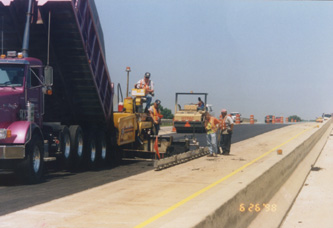U.S. Department of Transportation
Federal Highway Administration
1200 New Jersey Avenue, SE
Washington, DC 20590
202-366-4000
Focus
| Accelerating Infrastructure Innovations |
Publication Number: FHWA-RD-01-067
Date: September 2001
A well-trained workforce is a more efficient and effective workforce. With that goal in mind, the Transportation Curriculum Coordination Council (TCCC), formed in the summer of 2000, has dedicated itself to improving training opportunities for transportation workers. The Council's goals also include developing a national core curriculum that can be used by any agency and building partnerships among State highway agencies and industry associations so as to save time and costs in developing training materials.
The TCCC, whose members include representatives from State highway agencies, Federal Highway Administration (FHWA) and its National Highway Institute, and industry associations, recently held its second meeting in Williamsburg, Virginia. Members discussed progress made to date and goals for the coming year.
The Council brings together five regional training and certification groups, each of which gave updates on their recent work at the meeting. The Mid-Atlantic Region Technician Certification Program (MARTCP) offers several training programs to its participating States, including Soils and Aggregate Compaction Technician, Aggregate Technician, Hot-Mix Asphalt Field Construction/Paving, and Pavement Markings Technician. "The training manuals for each program do not contain specifications and are generic enough that they can be used by anyone," says Woody Hood of the Maryland State Highway Administration.
The Western Alliance for Quality Transportation Construction (WAQTC), which serves 12 Western States, is now in its fourth year. The Alliance offers standardized instruction and certification in five areas: embankments, concrete, aggregate, density, and asphalt testing. Generally there is reciprocity among member States in recognizing technicians certified by a member of the Alliance. Some States, however, have add-on requirements that must be fulfilled before a technician can work in that State. The Alliance has a Web site (waqtc.org) that contains links to each of the member State Department of Transportation sites. While each State maintains its own database of qualified employees, a single numbering system is used so employees can be tracked by number by different States.
 |
|
|
Twelve Southeastern States, meanwhile, have joined together to form the Southeast Task Force for Technician Training and Qualification (SETFTTQ). "The Task Force's goal," says Tom Malerk of the Florida DOT, "is to share information to assist in developing individual States' training and qualification programs." Current priorities include developing a shared training program library, updating existing training programs, and developing new training programs based on the congregate needs of the member States. The SETFTTQ's Web site (www.dot.state.fl.us/statematerialsoffice/setaskforce/) provides contacts for each State's training programs.
The North Central Multi-Regional Training and Certification Program (M-Trac) has 10 members, with many of its States following reciprocity policies for certifying highway workers. According to Chris Anderson of the Iowa DOT, current needs identified by M-Trac include developing field construction courses, basic materials courses for maintenance staff, and train-the-trainer courses for lab technicians.
Nearly 2,500 people have been certified by the New England Transportation Technician Certification Program in various work areas, with many more courses expected to be available next year. New training courses in development include Hot-Mix Asphalt (HMA) Paving Inspector and Soils and Aggregate Technician.
Council members also discussed greater partnering efforts among the different regional groups. As Lee Onstott of the New Mexico State Highway and Transportation Department noted, "There are a lot of reasons why we need to get together and coordinate our efforts." These include a shortage of experienced and trained personnel that is faced by all States and the need to reduce redundancy and cut time and costs. "There is no need to develop five slightly different training modules. Do it once and do it right," says Onstott. Coordination will be aided by a new TCCC Web site that is being developed. The Web site will include core training materials in various subject areas that can be used as qualification or certification tools by States.
Training materials currently under development by TCCC members that have been identified as top priorities include a geotechnical course on drilled shaft training, an HMA construction course, and training for quality assurance technologists.
The TCCC work received a boost this summer when the American Association of State Highway and Transportation Officials' Subcommittees on Construction and Materials both voted in favor of a resolution supporting a national pooled-fund effort to support training development. This concept has also received support from the Association of General Contractors and the American Road and Transportation Builders Association.
For more information on the TCCC, contact Howe Crockett at FHWA, 360-696-7750 (fax: 360-696-7846; email: howe.crockett@fhwa.dot.gov), or John Perry at FHWA, 202-366-2023 (email: johna.perry@fhwa.dot.gov). For more information on contacting the regional training and certification groups, see sidebar.
|
Contacts Mid-Atlantic Region Technician Certification Program (MARTCP) Woody Hood, Maryland State Highway Administration 410-321-4100 (email: whood@sha.state.md.us) North Central Multi-Regional Training and Certification Program (M-TRAC) Chris Anderson, Iowa DOT 515-239-1819 (email: christie.anderson@dot.state.ia.us) New England Transportation Technician Certification Program (NETTCP) Chris Bowker, NETTCP 781-837-2680 (email: nettcp@netway.com) Bruce Yeaton Maine DOT 207-287-2171 (email: bruce.a.yeaton@state.me.us) Southeast Task Force for Technician Training and Qualification (SETFTTQ) Jack Cowsert, North Carolina DOT 919-733-7088 (email: jcowsert@dot.state.nc.us) Tom Malerk Florida DOT 352-337-3170 (email: tom.malerk@dot.state.fl.us) Western Alliance for Quality Transportation Construction (WAQTC) Tom Baker Idaho DOT 208-334-8439 (email: tbaker@itd.state.id.us) Garth Newman Idaho DOT 208-334-8039 (email: gnewman@itd.state.id.us) |